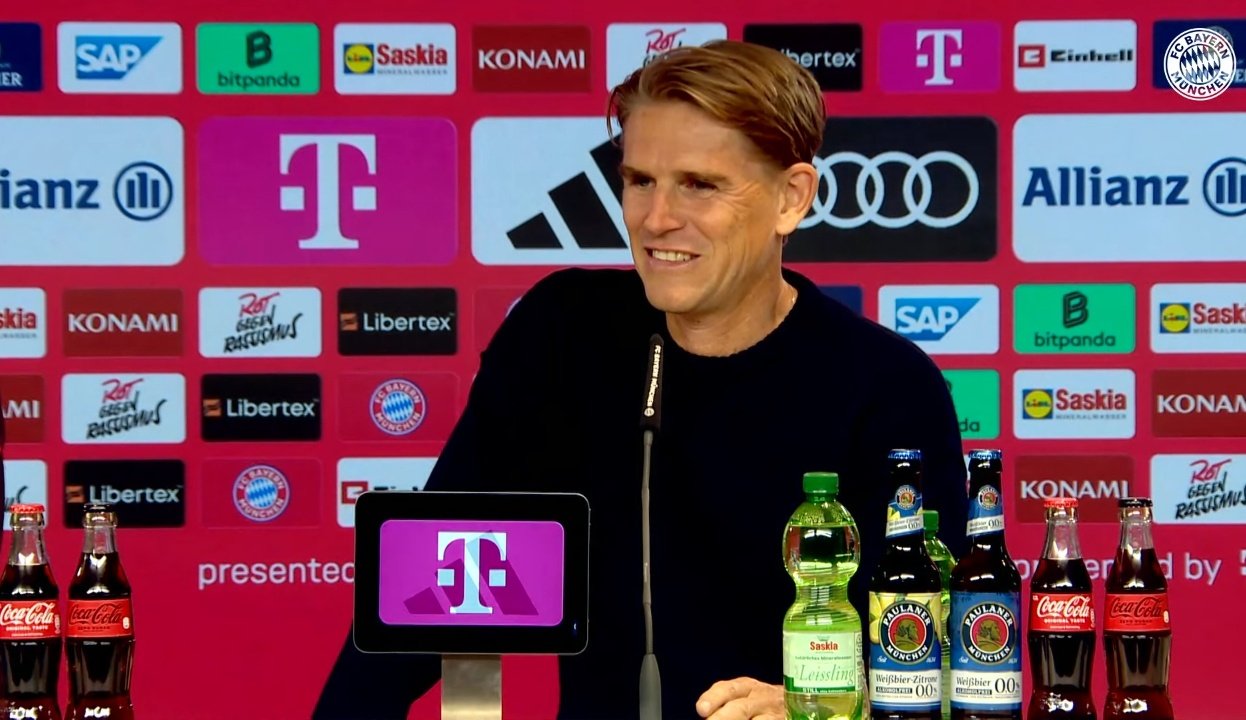Paul Wanner, one of the most exciting young talents in European football, is at the center of a growing debate regarding his future on the international stage. The Bayern Munich starlet, who has impressed with his performances at the club level, faces a significant decision: whether to represent Germany or Austria at the national team level.
The situation has drawn attention from fans, pundits, and even high-profile figures in the football world. One of these figures is Christoph Freund, the sporting director at Bayern Munich, who recently weighed in on Wanner’s dilemma. In a candid interview, Freund acknowledged that the decision ultimately lies with Wanner but also expressed his thoughts on the matter, balancing his personal connection to Austria with his professional understanding of the player’s situation.
Paul Wanner’s rise through the ranks has been meteoric. The 18-year-old midfielder has been hailed as a future star since his early days in Bayern Munich’s youth academy. Known for his vision, technical ability, and composure on the ball, Wanner has quickly become a player to watch not only in the Bundesliga but also on the international stage.
Having made his debut for Bayern Munich at just 16, Wanner’s potential is undeniable. His performances in Germany’s top league have already earned him comparisons to some of the greatest midfielders in the game, and Bayern Munich have been keen to nurture his talent. As he continues to develop, the question of his international allegiance has become increasingly relevant.
Wanner is eligible to play for both Germany and Austria due to his dual citizenship. Born in Germany to an Austrian father, Wanner is in the enviable position of being able to choose which country he wishes to represent. Both national teams have a strong interest in securing his services, and with his talent, he could potentially become a key player for either side.
Christoph Freund, who took over as Bayern Munich’s sporting director in 2023, is well-acquainted with Wanner’s situation. As a native Austrian himself, Freund naturally feels a sense of pride at the prospect of Wanner representing Austria on the international stage. However, he was careful to emphasize that the decision must be Wanner’s alone.
“It’s his decision to make,” Freund said. “As an Austrian myself, I would of course have nothing against him playing for Austria. But in general, this is a very personal choice, and it’s important that he makes the decision based on what’s best for his career and his heart.”
Freund’s comments reflect a balanced view. While he personally would be thrilled to see Wanner don the Austrian jersey, he understands that this decision carries great significance for the player’s future and identity. For Wanner, the choice is not just about footballing success, but also about where he feels the strongest sense of connection and belonging.
Both Austria and Germany offer compelling reasons for Wanner to choose them. The German national team has a rich history of success, having won four FIFA World Cups and three European Championships. For Wanner, joining the German setup would mean competing at the highest level, with the possibility of being part of a team that consistently vies for international titles.
Germany is also known for developing young talent, and Wanner could find himself playing alongside some of the most promising young stars in Europe. With Germany undergoing a period of rebuilding under new leadership, Wanner could become a central figure in the team’s resurgence.
On the other hand, Austria presents a unique opportunity for Wanner. As a smaller footballing nation, Austria has recently made significant strides in international football, with an increasingly competitive squad and a growing presence in major tournaments. For Wanner, playing for Austria could mean being the focal point of a team where he could develop into a national icon, similar to how David Alaba has done.
Austria’s appeal lies in the chance to be a big fish in a smaller pond. Wanner could become a crucial player in Austria’s ambitions to qualify for and succeed in major tournaments, giving him a leadership role that might be more difficult to attain in the highly competitive German squad.
As Wanner’s performances continue to draw attention, the pressure to decide his international future will only increase. Both Austria and Germany are keen to secure his commitment, and fans from both countries are watching closely. The decision will likely come down to Wanner’s personal feelings about where he wants to play and the opportunities each country offers.
Freund, while expressing his personal hopes, also emphasized the importance of letting Wanner make the decision in his own time. “He has to feel comfortable with the choice,” Freund said. “Whether it’s Austria or Germany, the most important thing is that Paul can continue to grow and develop as a player, and that he feels he’s made the right decision for himself.”
For Paul Wanner, the decision of which national team to represent is not one to be taken lightly. Both Germany and Austria offer distinct advantages, and the young midfielder will need to weigh his options carefully. Christoph Freund’s comments underscore the complexity of the choice and the understanding that, while national pride is important, the decision must ultimately be based on what’s best for Wanner’s future.
As Wanner continues to excel at Bayern Munich, his performances will only heighten the stakes of this decision. Whether he chooses Germany or Austria, one thing is certain: Paul Wanner is poised to become a major force in international football for years to come.
